CDN security helps to provide a safe and fast web browsing experience to your visitors. Effective web security requires a global effort on many layers of a website: the code, the web server configuration, the hosting, the password creation, etc. This comprehensive effort looks overwhelming, but it does not need to be that way, thanks to the help of a CDN!
This article explains how CDNs protect and secure the users on the Internet.
What’s CDN Security?
CDN security protects against attacks and threats that want to negatively impact the visitors of a website. A CDN allows safer browsing by delivering the content more securely through its own network. This improves the overall experience for visitors coming to your website.
Before getting to the heart of the matter and talking about CDN security, it is essential to recall some notions of web security.
What’s Web Security?
The Internet can be a threatening place, and we frequently hear of websites going offline or displaying damaging information due to attacks. In some cases – and even for the most famous companies in the world – we are talking about millions of passwords, email addresses, and credit card details that have been leaked to the public. For a business, it definitely hurts the brand reputation and can result in financial loss for both the company and the customer.
Cybersecurity aims to prevent these attacks and protect websites from unauthorized access, use, modification, destruction, or even disruption.
The Main Safety Risks That a CDN Can Prevent
A CDN protects your website from DDoS attacks because it acts as a shield for the origin server. Instead of making your website unavailable, it simply sends and redirects the traffic to other functional edge servers (also called PoPs).
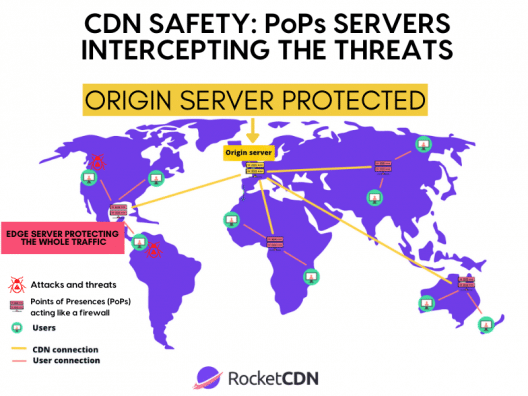
CDNs also protect from layer 7 of a DDoS attack that directly targets the server and the whole organization network.
For example, Bunny CDN uses artificial intelligence to protect against ‘Layer 7’ DDoS attacks by inspecting traffic and comparing it against known malicious patterns:
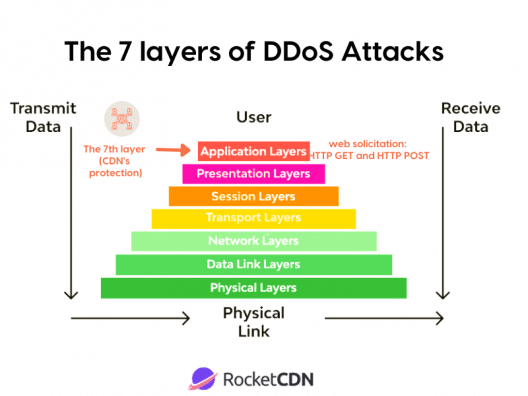
How To Prevent Attacks with a CDN
The most common way to prevent an attack on the origin server is by using proxy rules. As CDNs connect a visitor with all the organization’s web servers, it makes CDNs the best candidates for preventing security threats before they reach an actual asset (such as the origin server).
From the perspective of a cyberattack, CDNs can be thought of as the first line of pawns used as a diversion. They buy time to identify attacks and divert them without reaching the original server.
| 📖 The main CDN security will be its firewall. It can mitigate attacks on the DNS level rather than let the origin server deal with them. |
Why CDNs are Safe and Also Improve Security
CDNs are safe and strengthen the security of your web content going through the edge servers. Let’s go over some of the ways CDNs protect and secure the Internet.
Best Practices to Improve Content Delivery Network Security
A CDN improves the security of a website provided that it meets a list of best practices. Here are the features that a CDN should have to ensure optimal security:
1. Fights against DDoS attacks
A CDN must have specialized DDoS attack tools to protect your DNS environment. These technologies dedicated to protecting against DDoS attacks may include, for instance:
- Specially designed PoPs that are made to absorb only DDoS traffic
- Automatic traffic inspection and cleaning
- Proactive 24-hour monitoring tools that can prevent attacks from occurring
2. Handles unexpected online traffic surges (reliability and redundancy)
A reliable CDN should be able to cope with sudden traffic spikes and network congestion and maintain fast loading times for visitors (at any time of the day and during promotions, e.g., black Friday operations). In fact, an attack often results in a sudden spike in traffic. However, with an effective CDN, your site should never be taken offline.
Similarly, redundancy is also needed to ensure security. Redundancy is a communication network that adds extra links to connect all nodes in case one link or any hardware breaks down.
3. Has a high resiliency and secure Points of Presences (PoPs) across the world
The benefit of a CDN is to avoid network congestion by caching static content. However, the security risk is that any user with root-like permissions on a CDN server can illegally access the website and misuse the content. Every CDN PoP should be highly secured to avoid any intrusions. This can be done by using intelligent failovers, load balancing the traffic, and always maintaining the edge servers.
| Intelligent failovers strategy = if a server goes down, the traffic is rerouted to a still working server. |
4. Has an excellent Web Application Firewall (WAF)
A CDN that comes with an effective Web Application Firewall will protect any applications efficiently. A WAF filters and monitors internet traffic between an origin server, a specific application, and the whole internet. An efficient Web Application Firewall gives you protection out of the box for different types of attacks: common WordPress attacks, SQL injection, and removal of file inclusion.
5. Enhances SSL/TLS encryption
Transport Layer Security (TLS) is an internet protocol used to encrypt data sent over the internet. You can see this certificate on any website that begins with “https://” rather than “http://”. These encryption practices are necessary to prevent hackers from accessing important or confidential data. The SSL (Secure sockets Layer) is a protocol used to establish a secure connection between the browser and the server and a web browser (such as login information, emails, password, and all type of encrypted data. )
To enable TLS, a site needs an SSL certificate and a corresponding key. Most CDNs provide the key and the certificate to secure the content hosted on their network. Since visitors only connect through the CDN, an older or less secure certificate used between the origin server and the CDN will not affect the customer experience.
6. A CDN should have a high rate of caching hit ratio (CHR)
Cache hit ratio calculates how many contents requests a cache is able to make successfully, compared to the number of requests it receives. A high-performing CDN that provides an efficient cache policy will have a cache hit ratio superior to 95%.
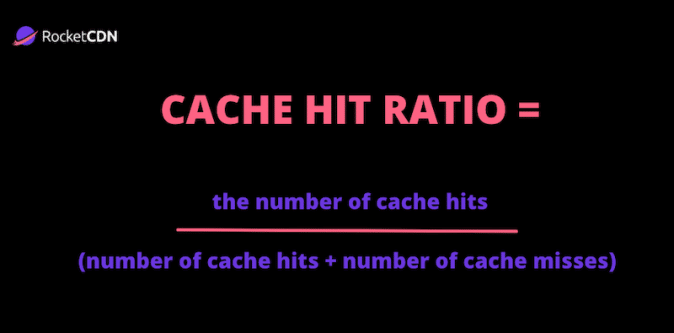
Interpreting the results
- CHR of 95-99%: successful score.
A secure CDN is key, but a CDN should also reduce network latency. If you start to notice a slower delivery of content, this will negatively impact the web experience for users. When picking up a CDN, choose a safe and reliable one in terms of performance (with low latency.)
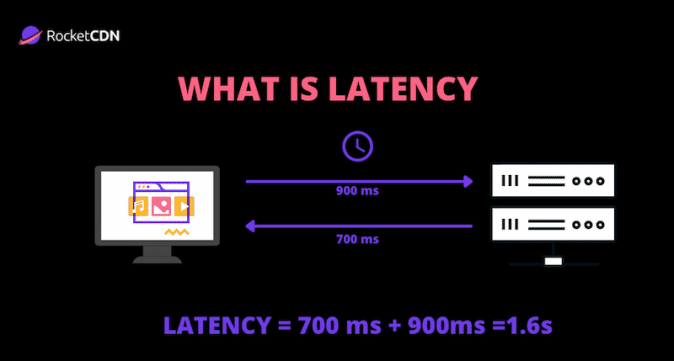
RocketCDN Features that Enhance Web
Security
RocketCDN is one of the safest CDNs. Plus, it makes your website load faster, helps meeting Core Web Vitals requirements, and improves the overall user experience. It has a user-friendly interface and automatically applies the best security and performance settings to your website.
The CDN has several performance features such as static asset caching, Gzip compression, image optimization, and online content delivery, but in this section, we will focus on the security-related functionalities.
✅ RocketCDN comes with an efficient Web Application Firewall (WAF) that protects you from different types of attacks.
✅ Powered by Bunny CDN, RocketCDN offers more than 121 PoPs (edge servers) to ensure worldwide coverage. This minimizes latency caused by geographical distance and also protects the original server. The PoPs are highly secured servers that can identify the threats and DDoS attacks thanks to artificial intelligence before they hit the origin server.
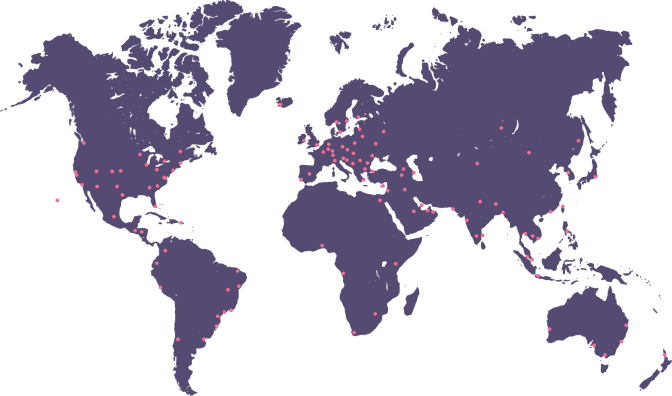
✅ RocketCDN is designed to circumvent network congestion and be resilient against any service interruptions in case of sudden peaks in traffic. It includes unlimited bandwidth use, so there is no bad surprise on the monthly invoice.
✅ The out-the-box protection provided by RocketCDN also has its own protection called “Origin Shield”. It uses advanced load balancing to equally distribute the load with an intelligent failover strategy (if there are any issues, requests are immediately and automatically rerouted to another functional edge location).
✅A Cache Hit Ratio is superior to 90% – meaning that the cache can successfully process almost all the requests. A high cache hit ratio helps to define if a CDN is effective or not.
✅ Includes Secure Sockets Layer (SSL) traffic and serves assets in HTTP2 (which is more secure as it uses binary protocol instead of plaintext).
✅ RocketCDN is one of the best CDN for WordPress sites. It’s also compatible with every CMS and the rest of the web tools. For WordPress users, there is a dedicated WordPress plugin that automatically points all your assets to RocketCDN.
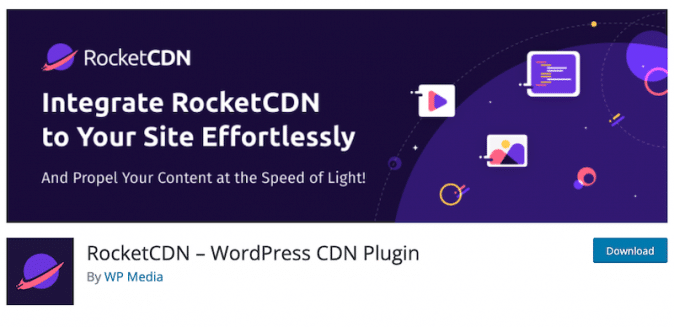
CDNs help secure and protect the data transferred across many different locations by intercepting packets of information as they move across the world. A reliable CDN like RocketCDN will secure your site and also make you reach your performance goals. There are no advanced settings to perform on the user’s side with RockectCDN: it does all the heavy lifting for you.
You can try it and cancel your subscription for free up to 24 hours after your purchase. Make your website faster and more secure with RocketCDN today!